AI applications in industry have been reshaping how businesses perform certain tasks. Whether it is the integration of smart AI agents for better customer assistance or it is the use of predictive analysis in the manufacturing industry to get an accurate estimation of stocking, there is a vast significance of AI in industry.
According to Statista, the global AI market is valued at $243 billion in 2025, which is further expected to increase with a CAGR of 27.67% to achieve a valuation of $826.73 billion by the end of 2030. The sharp growth of the AI market well-portrays the application of artificial intelligence across industries to achieve competitive advantages.
If you are keen to explore AI use cases in your industry, this blog is for you. Here, we will discuss how an AI development company can help reshape businesses across various industries. Let’s get started.
Role of AI in Business Operations?
AI has been playing a transformative role in enabling automation across industries, providing insights, helping in decision-making, saving unnecessary costs, and bringing a competitive edge. Not only does it help businesses to scale sustainably, but it also helps to optimize the existing resources in a way that maximum productivity can be achieved without further investments. Here are the core roles that AI has been playing in business operations across industries-
1. Automation and Efficiency
Whenever we talk about use cases of AI, automation, and efficiency come first. Artificial intelligence is widely used to automate repetitive and time-consuming tasks, which multiplies the overall efficiency by increasing the average productivity by 10✖. At the same time, artificial intelligence also helps in optimizing the business processes that steer the faster workflow and reduce errors.
2. Data Analysis and Insights
AI also plays a significant role in helping businesses analyze vast amounts of data and predict future trends and market demands accurately. It helps in identifying the areas of opportunities to grab them at the right time. At the same time, AI is also used for informed decision-making as it can analyze the information and provide the right suggestions according to existing market conditions.
3. Customer Service
Customer service standards have significantly elevated since AI chatbots have emerged in the market. These smart AI agents help the customers to use natural language to tell their feedback or queries and then analyze the vast data to provide them with the best solution. At the same time, these AI solutions are also trained on analyzing the nature of the query to connect the customer to the right person in one go. Moreover, the performance of these AI chatbots increases with time as they can learn from experience.
4. Marketing and Sales
AI has been playing a role in increasing the return on investment for marketing and sales. Artificial intelligence helps firms to analyze the nature of the product and service to find the target audience. The AI-based marketing software ensures that the advertisement is displayed only to the people who are interested in the product or might need the particular product or service. This personalization strategy helps increase the chances of lead conversions.
5. Security
There is a big role of AI in adding a strong layer of security in the technology infrastructure of numerous businesses. Artificial intelligence is trained to identify and read the patterns to recognize the anomalies in the system. As soon as any disruption is identified, the AI system informs the relevant authorities. Some advanced AI systems are even capable of performing certain preventive tasks as soon as any disturbance is reported in the system to eliminate the chances of a big impact.
6. Better Customer Experience
Industries using AI have been providing a better customer experience to their customers as compared to the competitors. For example, the AI applications in the industry help in providing relevant product and service recommendations to the customers, which leads to higher purchase value. At the same time, continuous customer service and support enable the customers to get rid of their queries without waiting in long queues, which enhances their overall experience with the brand.
7. Customer Behavior Analysis
In a market where the customer acquisition cost has increased to a significant extent, it has become very important for businesses to know their customers and serve them accordingly. So, artificial intelligence helps businesses to understand the needs and preferences of their customers by identifying their demographics, occupations, age, and other data. So, personalized selling strategies help close more deals and increase the overall revenue.
15+ Use Cases of AI in Major Industries
As interpreted in the earlier section, artificial intelligence has been helping businesses pave their way to success by imparting automation, accuracy, and efficiency. Whether it is providing a personalized experience to the customer or increasing the productivity of employees, artificial intelligence has proved to be an innovative technology that enhances operational efficiency and drives overall business growth.
Let’s understand how AI applications in the industry are altering the ways business operates and perform tasks.
1. Healthcare
Artificial intelligence has revolutionized the way healthcare institutions connect and perform the diagnostics of patients. According to statistics, AI in the healthcare market is all set to achieve a valuation of $173.55 billion by the end of 2030. Whether it is rising costs, lack of healthcare access to remote people, or the process inefficiencies that cause patient care in healthcare institutions, AI has played a significant role in elevating the overall standards and making the process seamless.
There are various applications of artificial intelligence in the healthcare industry, including telemedicine, personalized medicine recommendations, early diagnostics and treatment of diseases, curating a healthy lifestyle for patients, drug discovery and much more.
Example- The healthcare AI system curated by Google has demonstrated an accuracy of 94.5% in detecting breast cancer symptoms in patients, which is much higher than any healthcare professional.
2. Retail and e-commerce
This is one of the most competitive yet benefited industries by applications of artificial intelligence. The emerging technology has been helping retail businesses optimize their inventory, enhance shopping experience, provide better customer service, and set new standards for satisfaction. First of all, the AI integrations make sure that the customers don’t have to scroll through endless pages to find the right product.
Based on the customer buying behavior, and keywords, it lands the customers on the right product URL in no time. Also, AI provides continuous customer support that helps the end-users collect information, get pricing, request a return, exchange, and much more. Statista suggests that AI will increase overall eCommerce sales by 59% by providing the product recommendation.
Example: Walmart, one of the biggest retail chains, has reduced its overstock issue by 15% and stockout issue by 30% by using the smart inventory management system.
3. Banking and Financial Services
Artificial intelligence has been integrated into various smart solutions to build comprehensive digital software for banking and financial services. Not only does it help to serve customers from a more diverse demographic, but AI also adds an extra layer of security for the financial institution.
The AI systems are capable of assessing the pattern and identifying the threats that might cause financial losses in the future. At the same time, the recommendation tools equipped with AI help the customers to choose the best insurance and investment schemes according to their personal preferences. All these useful AI applications in the industry have steered a CAGR of 19.72% in the market, ultimately leading to a valuation of $61.6 billion by 2032.
Example: Bank of America has been using the smart agent named Erica that enables the customers to leverage features like tracking their spending habits, managing payments, and increasing the overall engagement rate by 25%.
4. Supply Chain and Logistics
The supply chain and logistics industry is experiencing more transparency than ever by using artificial intelligence technology. AI in logistics helps in supply chain optimization that promises increased productivity, better use of resources, and safety of drivers.
By using AI safety systems like alcohol checks, driver activity tracking, and the working times of the drivers, the software helps to reduce the chances of accidents. At the same time, AI helps to identify the best routes and provides the right navigation that saves time and fuel in real-time. According to statistics, more than 68% of supply chain organizations use AI for increased traceability and visibility of their fleets.
Example: The ORION system by UPS has helped the organization to save over $400 million by navigating the right routes with the least traffic and best road conditions.
5. Travel
AI when integrated into the travel and tourism industry, helps businesses to better connect with their customers and provide better suggestions. Based on past trips and social media data of customers, AI helps in suggesting best activities, right hotels, appropriate mode of travel, and most relevant destinations.
The AI tools even help in curating the right quotations for different types of trips while taking care of the customer’s spending habits and the business revenue model. These quotations are so personalized that there are huge chances of customers liking them. At the same time, the sentiment analysis technology powered by AI helps in understanding customer emotions and identifying improvement areas.
All these use cases have driven the significant adoption of AI by tourism businesses, making it a market size of $2.95 billion in 2024.
Example: Hilton Group is already testing AI-powered features that can support personalized guest bookings for stays and meals as a part of their service packages.
6. Real Estate
There are numerous benefits that real estate businesses can leverage by using AI. It includes smart investment decisions, the right property valuation, better risk assessment, seamless property management, and much more. There are automated valuation models that assess the property locations, characteristics, historic sales data, and market trends to provide the right estimation of property value and selling price.
Also, the predictive analysis capability helps to analyze the upcoming market conditions and thus inform the real estate agency to make smart decisions about buying or selling a particular property at a particular location. Machine learning technology is ruling the AI market share with 44% in the real estate industry.
Example: Keyway is an AI-powered real estate software that uses data science to help make better decisions about selling and buying a property at a specific time.
7. Media and Entertainment
The global AI in the media and entertainment market is growing with a CAGR of 26% to achieve a valuation of $99.48 billion by 2030. From creating content from scratch to elevating the reach of social media profiles, AI has brought many disruptions in the industry. For example, the OTT platforms have been long leveraging the benefits of AI recommendation engines to suggest relevant content to their users and increase their engagement on the platforms.
Whether it is suggesting movies to new users or reminding the user about their incomplete movies when they are not on the app, AI applications in the industry helped OTT owners to increase overall engagement. At the same time, AI-powered technologies like AR/VR have created a space of interactive entertainment that generates another revenue stream for people in this industry.
Example: Netflix uses the AI-based recommendation system that helps in suggesting relevant content to users and increases their watch time on the app.
8. Manufacturing
AI applications in the industry help to improve workforce productivity, reduce overall downtime, and lead to insight-driven decision-making. For example, smart AI solutions are designed to assess historical data, market demands, product supply, and much more.
AI use cases in manufacturing enable business owners to make informed decisions about inventory levels, helping to avoid overstocking and stockouts. The sharp adoption of AI in the manufacturing industry has led to a market valuation of $8.57 billion in 2025.
Example: BMW, a car manufacturing company, uses artificial intelligence to identify the defects in their unit and correct them while reducing the overall operational costs.
9. Automotive
Whether it is vehicle design or adding advanced functionalities according to the needs of customers, AI helps automotive companies to work on their driving experience and achieve competitive advantages. For example, there are advanced driver-assistance systems that bring features like automatic emergency braking, blind spot monitoring, and enhancing road safety.
Similarly, production optimization capability helps automobile businesses assess the market demand to manufacture and supply the inventory accordingly. It helps to avoid unnecessary investment in shipping and raw resources. The increasing role of AI in the automotive industry has contributed to a CAGR of 29.61%. It means that the AI automotive market will achieve a valuation of $48.59 billion by the end of 2034.
Example: Ford Motor Company is all set to incorporate AI in their operations to redesign their vehicles, increase fuel efficiency, and elevate the overall safety standards.
10. Pharmaceuticals and Biotechnology
AI in industry is assisting significantly in identifying the right amount of drugs to make a particular compound while eliminating the need for countless tests and trials. It helps accelerate the drug discovery, improves patient care through personalized medicine, and enhances the overall clinical trials.
The AI system can use the algorithms to analyze the vast amount of the dataset, identify the potential drug target, and accurately predict the efficiency of the new compound. Similarly, it can help in designing the molecules to predict their interaction with the biological targets. According to Scilife, more than 80% of pharmaceutical companies are already using AI for drug discovery tasks.
Example: Pfizer is one of the early adopters of AI technology that is using smart AI tools to manage and analyze the data from their extensive drug development processes.
11. Education
From personalized learning to imparting better accessibility of education to remote learners, AI has made its significance in different parts of the EdTech sector. First of all, it helps educational institutions to focus individually on the students to identify their weakness areas. At the same time, the AI system also helps in curating personalized learning plans for the students according to their areas of interest.
The AI-driven automated administration tools help institutions to better handle routine tasks like enrollment, grading, and teaching schedules. According to a survey, 54% of the students who have used AI in their education have witnessed a spike in their engagement toward learning.
Example: The AI chatbot used by Georgia State University has streamlined the administrative workflow and reduced the student dropout rate by more than 21%.
12. Fashion
AI has been long transforming the fashion industry by enabling trend forecasting, visual try-ons, optimizing operations, and providing personalized experiences. Analyzing the vast amount of social media data, fashion blogs, and sales statistics helps the fashion brands to curate their marketing and manufacturing strategies accordingly.
At the same time, 3D design and virtual modeling technology allow designers and fashion businesses to visualize the overall look without investing time and money in production. Moving ahead, the AI algorithms help to provide customized fashion assistance to users based on their tastes. The current AI fashion market is valued at $2.23 billion, which is growing with a CAGR of 39.12% to achieve a valuation of $60.57 billion by the end of 2034.
Example: Zara relies on artificial intelligence to analyze real-time sales data and collect feedback from global audiences to identify emerging fashion trends.
13. Private Equity and Principal Investment
The foremost among the use cases of AI in this industry is deal sourcing, where it helps private equity firms identify potential investment opportunities. By analyzing tons of data, artificial intelligence enables businesses to collect insightful information and make smart decisions. Moving ahead comes due diligence, where AI analyzes a lot of information like financial statements, market data, and legal documents to enhance overall efficiency by analyzing critical factors.
Risk assessment is also a big use case of AI in the private equity and principal investment industry, where it can easily examine the risk factor associated with the investment opportunity. According to the data, 82% of private equity firms are actively using artificial intelligence in their operations.
Example: KKR, a private equity company, has improved its efficiency in handling a large amount of financial data, enabling quicker and better decision-making using artificial intelligence.
14. Legal Businesses
Legal businesses have been leveraging artificial intelligence for a range of reasons. First of all, it helps in contract analysis where it can extract the key clauses from the documents while eliminating the need for manual efforts. Moving ahead, it helps in legal research where it can analyze the extensive legal texts, precedents, and case law. By accelerating the research process, it helps in quicker decision-making.
The AI-powered chatbot and virtual assistants help legal firms to instantly answer clients’ queries without putting in manual effort. Also, AI tools have been enabling businesses in various industries to stay legally compliant with various regulations by identifying the changes in laws and regulations. As per data, more than 82% of the lawyers are either currently using AI or planning to integrate it into their practices.
Example: Big law firms like Clifford Chance have developed their own AI chatbots like CC Dr@ft to automate the drafting process of their legal documents and provide immediate assistance to their clients.
15. Information Technology
Whether it is building new software or getting assistance with routine tasks, AI has been significantly helping people in the IT industry to automate processes, leverage increased productivity, and increase overall efficiency. First of all, it helps in IT support and helpdesk automation, where AI-driven chatbots can provide virtual assistance by providing user inquiries about technical issues.
At the same time, AI adds another security layer by continuously monitoring the network and traffic along with the user behavior. Any anomalies in the systems are instantly identified and reported to the authorities. AI in the industry also helps in better IT asset management, where it can monitor the resource utilization pattern to keep the up-to-date inventory, along with ensuring the perfect maintenance schedule. Generative AI technology has been helping employees in the IT industry to multiply their productivity by at least 5✖ without taking an overload.
Example: Microsoft is one of the biggest IT companies in the world, which is incorporating AI in many of its product series like Windows, Microsoft 365, Xbox, and Teams.
16. Agriculture
Agriculture is considered one of the most sought-after industries as it has adopted technological trends at a slower pace compared to other industries. However, AI has changed the scenario with its extensive use cases in the agriculture industry. First of all, it helps in precision farming by ensuring optimized resource usage. For example, it can provide precise recommendations about irrigation, planting, pest control, and much more while eliminating waste and maximizing efficiency.
Similarly, AI tools are highly used for soil health monitoring, where they can identify the mineral and nutrient deficiency in the soil along with the treatment plans. The AI agriculture market has been growing with an impressive CAGR of 23.1% to achieve a valuation of $4.8 billion by 2028.
Example: John Deere integrates AI capabilities in its tools to optimize planting, fertilization, and irrigation based on soil conditions.
17.bFood and Beverages Industry
AI in the food industry has played a core role in safe eating habits, food sorting, quality inspections, precision agriculture, and food delivery optimization. There are a range of AI-driven solutions like AI recipe generation, personalized food experience, AI content generation for the food industry, and much more that help businesses operating in the food and beverages industry. For example, it has become significantly easier for restaurants to track the stock of their raw materials, utilize them before they expire, and identify the inventory that is no longer safe to use. Such use cases help businesses to comply with food safety legislation.
The increased efficiency of this sector with the help of artificial intelligence has led to a market size of $11.08 billion, which is further expected to increase with a CAGR of 37.30% till 2034.
Example: Spyce is a restaurant in Boston that uses AI and robotics to prepare the food in their kitchen. Robots are trained with AI algorithms to use and cook the ingredients, ensuring that each dish serves the same and expected taste.
Emerging AI Applications
Other than the above-defined core industries, there are many other exclusive use cases of artificial intelligence that we can’t witness in our daily lives. Here are some of the exclusive use cases of AI in more profound industries.
AI in Space Exploration
Artificial intelligence has been helping space agencies explore outer space without risking human life. For example, AI helps in processing massive astronomical datasets to predict space weather and identify exoplanets. Moreover, there are a lot of advancements that we can expect with the emerging AI capabilities. Future applications of AI in the industry might include AI-driven spacecraft that can adapt to unknown environments, advanced simulations for interstellar travel, and robotic systems for asteroid mining.
AI in Climate Change
AI is already playing a core role in predicting climate change by assessing vast amounts of data collected via satellites and ocean sensors. By using machine learning technologies, it can identify different patterns to recognize extreme temperature shifts, greenhouse gas emissions, and abnormal weather events, thus allowing scientists to develop accurate forecasts accordingly. The emerging trends of AI in climate change prediction include carbon capture technologies that provide much more accurate predictions about upcoming weather conditions as compared to any traditional tool or software.
AI in Cybersecurity
Whether it is identifying threats, automating responses, or preventing cyberattacks, AI has been transforming the cybersecurity industry forever. The AI-powered advanced systems assist in preventing phishing attacks, enhancing the fraud detection system, identifying viruses, running antivirus programs, and alerting the relevant authorities at the right time. Moreover, the auto-healing capabilities of the AI system help in repairing vulnerabilities and eliminating the chances of big losses. With the increasing threat to cybersecurity, the role of AI is set to increase for safer digital environments for individuals as well as businesses.
How Businesses Can Successfully Implement AI?
Implementing artificial intelligence in your business operations can be a great investment approach as AI business use cases bring a host of advantages with it. However, you must follow the right procedure for implementing AI in business operations.
Let’s go through a neat approach that can help you implement AI in your business operations without compromising the existing operational efficiency.
1. Focus on Your Business Needs
First of all, focus on identifying your business needs. It will help you to design AI solutions that can focus on real-time challenges, carry the relevant features, and solve the problems.
2. Define the Clear Scope
You must have a clear idea of what you expect at the end of AI implementation. Whether it is better customer service, enhanced data analytics, or increased employee productivity.
3. Data Collection and Preparation
Based on the type of software that you need, the data collection process is carried out. Once the datasets have been sourced, they are filtered and cleaned to make them suitable for AI model training.
4. AI Model Selection
Among the different types of AI models, this step consists of choosing the right AI technology that can help to build the right solution. It can be machine learning, natural language processing, or a combination of multiple AI models.
5. Integration
The final AI software is integrated into the existing technical architecture of the business. It can be enterprise resource planning software, customer relationship management software, attendance tracking software, or anything else.
6. Continuous Monitoring
This is the final stage where the development team continuously monitors the performance of the AI application to make the necessary changes and add new features.
Why The NineHertz for AI Applications in Industry
The efficiency of an AI implementation project depends highly on the development team you are partnering with. The NineHertz is an experienced team of AI developers with 15+ years of experience. During the journey, we have been a part of many startups to big enterprises in helping them visualize a digitally advanced future and achieve it.
We have industrial specialists who can understand real-time business challenges and curate customized business solutions using artificial intelligence. Our team loves to explore top AI use cases and bring them to reality to help businesses enhance their operational efficiency without unnecessary investments in resources.
Moreover, we provide free consultation sessions to businesses looking to implement AI in their processes. Our consultation helps the relevant stakeholders to get an idea about the required resources and make smart decisions. We offer ample maintenance and support to our clients after the solution deployment, which promises the durable performance of the AI solution.
Conclusion
It can be concluded that industries using AI have witnessed an increase of 300% in their productivity and efficiency. Similarly, the market size of AI in the industry is also registering a significant CAGR in different sectors. AI implementation is driving the market by providing a better customer experience, increasing sales, elevating collaboration, reducing downtime, and eliminating the need for unnecessary infrastructure. If you are also looking to implement AI in your business, grab our free consultation session to make the best decision.
FAQs
What are the most popular AI applications?
Answer – There are a range of AI applications that have been transforming industries forever. For example, there is predictive analysis that enables different industrial businesses to analyze vast amounts of data and predict upcoming events and market demands accurately. Similarly, there are product recommendation engines that enable businesses in the entertainment and eCommerce industries to increase their per-customer revenue by suggesting products, services, or content that they might like.
What are the types of AI applications?
Answer – There are different types of AI applications which include natural language processing, machine learning, generative AI, recommendation engines, data analytical tools, and much more. All these types of AI applications have their different use cases and help businesses in numerous scenarios.
How does AI differ from machine learning?
Answer – AI is a vast concept, whereas machine learning is a subset or particular application of AI. ML only talks about training computers so that they can learn from data without the need for explicit programming. AI is a broader term that focuses on creating machines that can perform tasks, while machine learning is a key component that allows AI-based tools to learn from data and improve performance over time.
What are the benefits of implementing AI in business?
Answer – There are many benefits of implementing AI in business. It includes increased efficiency, more productivity, better decision-making, new business capabilities, cost reduction, continuous customer support, better customer service, predictive analytics, etc.
How can small businesses leverage AI?
Answer – Small businesses can identify their existing challenges to build and implement a basic AI solution to solve those challenges. By increasing their operational efficiency step by step, they can scale their business with the help of AI and bring more advanced features into the systems to provide a personalized experience to their customers and lead sustainable business growth.
Great Together!
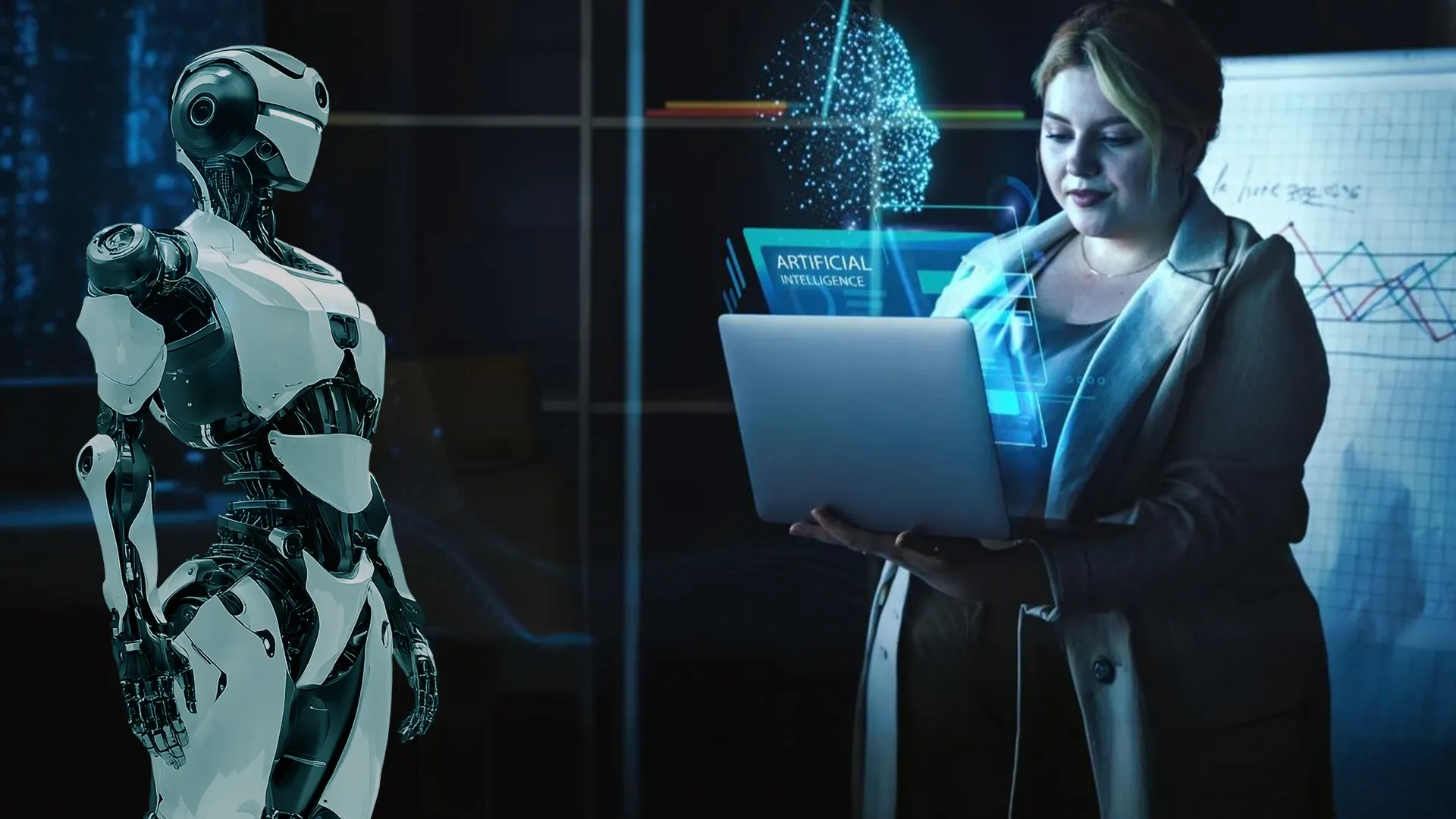
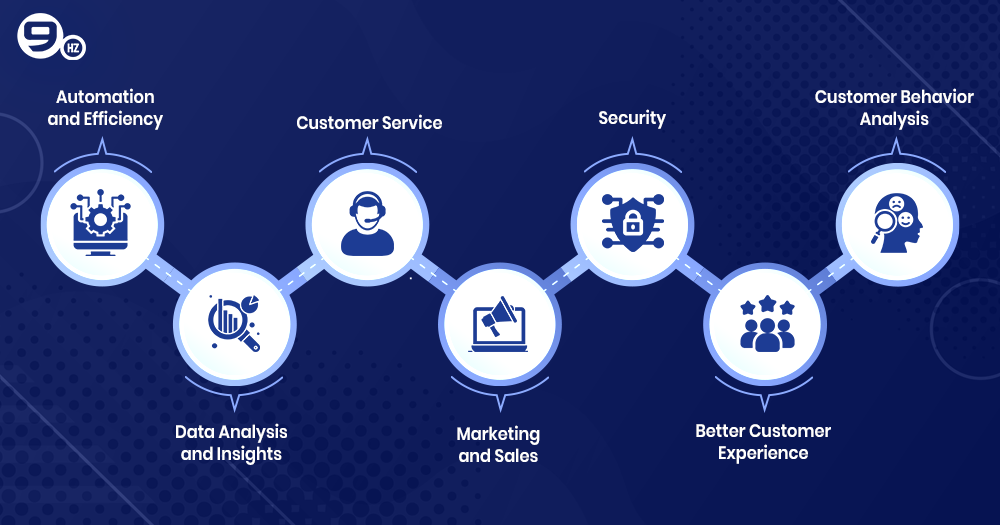
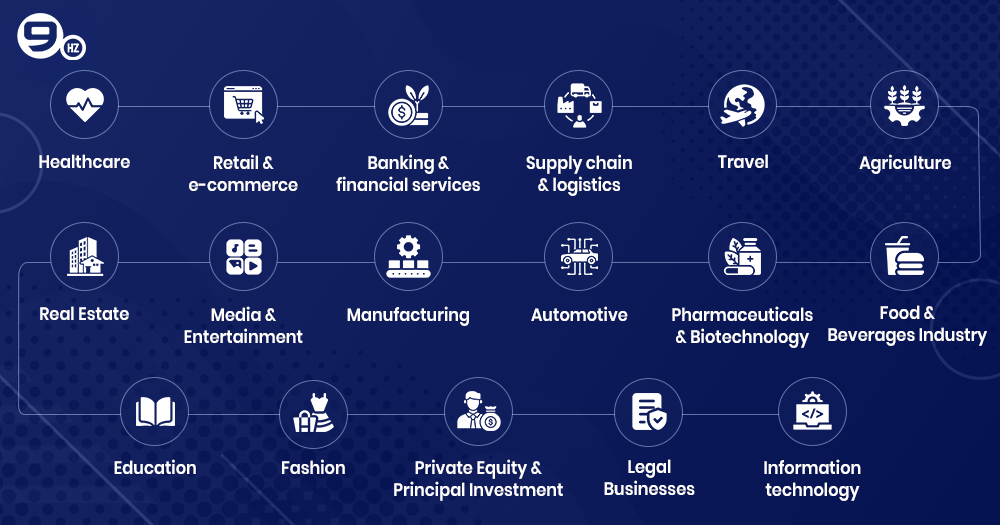
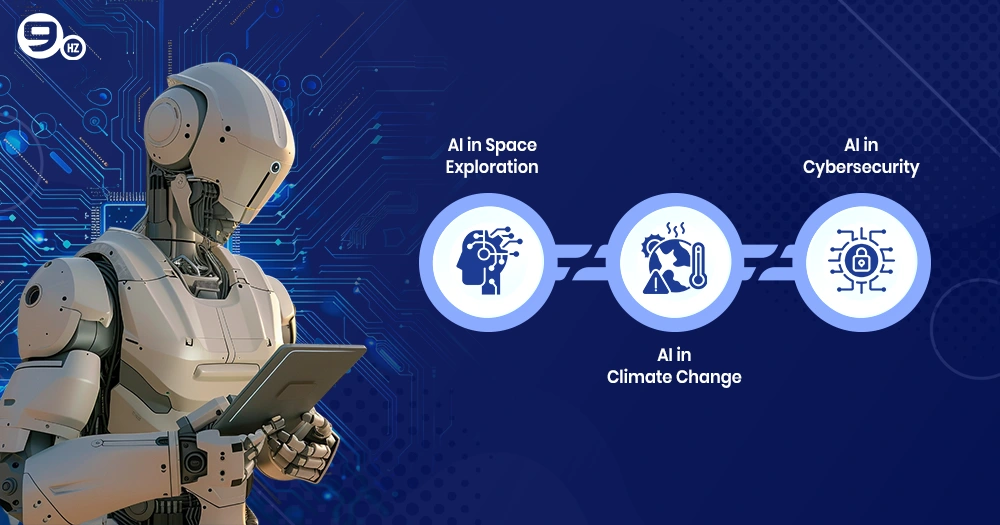
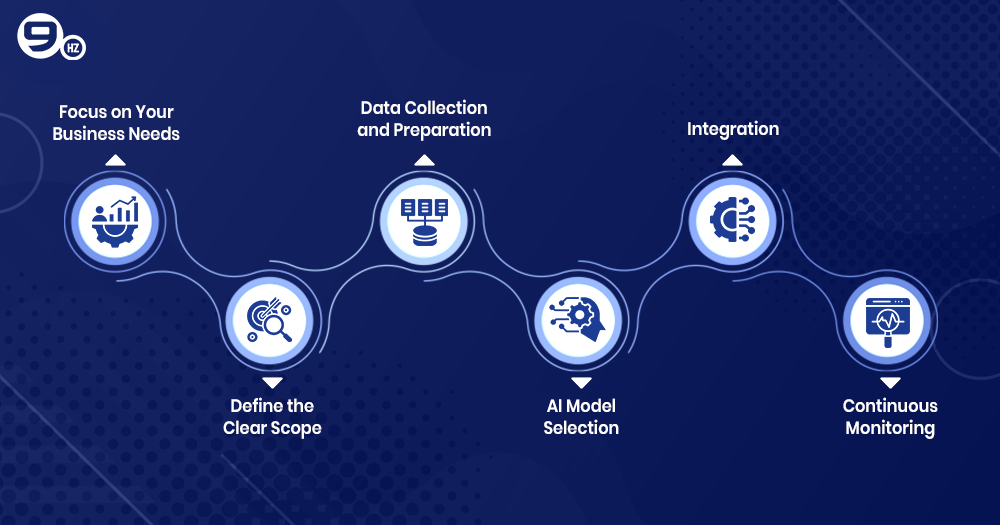
![Building Agentic AI Applications with a Problem-First Approach [2026 Guide]](https://theninehertz.com/wp-content/uploads/2026/02/Building-Agentic-AI-Applications-with-A-Problem-First-Approach.png)







